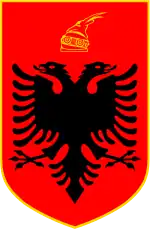State Police (Albania)
The Albanian State Police (Albanian: Policia e Shtetit) is the national police and law enforcement agency which operates throughout the Republic of Albania. The collapse of the Communist system and the establishment of political pluralism post-1991 brought important changes to the structure of the Albanian Police. The Ministry of Public Order and the General Directorate of Police were established in April 1991, and the new law of July 1991 established the Public Order Police. Nearly 80% of police manpower, i.e. personnel who had served under the previous system, were replaced by new recruits. On 4 November 1991, the Albanian Police was accepted as a member of Interpol. The emergency number is 129.
| Albanian State Police Policia e Shtetit Shqiptar | |
|---|---|
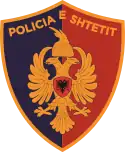 Patch of the State Police | |
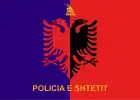 Flag of the State Police | |
| Agency overview | |
| Formed | 13 January, 1913 |
| Preceding agency |
|
| Employees | ~ 10,958[1][2] |
| Jurisdictional structure | |
| National agency | Albania |
| Operations jurisdiction | Albania |
| Size | 28,748 km2 |
| Population | 3,038,594 |
| Governing body | Government of Albania |
| Constituting instrument |
|
| General nature | |
| Operational structure | |
| Overviewed by | Ministry of Internal Affairs |
| Headquarters | Bajram Curri Boulevard, Tirana |
| Minister responsible | |
| Agency executive |
|
| Website | |
| asp | |
History
The original Albanian Police was founded on 13 January 1913 by the government of Ismail Qemali, Albania's first prime minister.[3]
The crisis of 1997
Following the collapse of the Albanian economy in January–February 1997 in the wake of the implosion of the Ponzi pyramid banking schemes promoted by the government,[4] increasing insurgency in early March led to the Police and Republican Guard deserting en masse because it became clear they were unlikely to be paid, leaving their armouries unlocked,[5] which were promptly looted by parties unknown, believed to mostly have been the local crime bodies and self-appointed militias: many of the weapons eventually surfaced in the ethnic fighting in Kosovo.
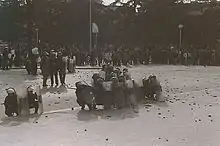
The resulting anarchy led a number of nations to use military forces to evacuate citizens,[6][7] culminating in the UN authorising Operation Alba ("Daybreak"), a short-term military stabilisation force led by the Italian Army, tasked with facilitating the repatriation of foreigners and laying the foundations for another International Organisation to undertake the longer-term restabilisation. The political debate eventually settled in Europe within the body responsible for the defence diplomatic coordination of the Continent, the Council of the Western European Union. In a 2-hour meeting which convened at 1400 hrs on 2 May 1997,[8] the WEU Council decided on the immediate establishment of the Multinational Advisory Police Element, sending a pathfinder officer, a Norwegian Police Colonel, the same evening. The Italian force in Operation Alba predicated the Command structure of MAPE passing into the Italian Carabinieri, General Pietro Pistolese, previously commanding the Genoa region, bringing his team with him. Four phases followed, assessment, reconstruction, support of the Albanian Police control during the Kosovo Crisis, and finally build-down and handback in early 2001, which was somewhat accelerated ahead of the transfer of the WEU's operational responsibilities to the Council of the EU on 30 June 2001. The reconstruction principally involved the reconstruction of the Judicial system and the training of Police, but the Finance section also accommodated economic specialists acting as the principal feedback into the correction of the Judicial system. The Command Team later formed the core of the European Union Border Assistance Mission Rafah from 2005 onwards.
Public Perception

According to a survey produced in 2009 for the United States Agency for International Development Albanian's perception of the police was as follows:[9]
- On a scale of 0–100 with 0 being Very Honest and 100 being Very Corrupt, Policemen were given a score of 63.1 points
- When asked to what extent the police help to fight corruption, 0 being Not at All and 100 being Helps a Lot, the Police were given a score of 45.5
- When asked about trust in institutions, 0 being No Trust at All and 100 being Trust a Lot, the Police were given a score of 47.8
- When asked if during the previous year they had been asked for a bribe 7.8% said Yes
- "When asked how they were treated by the police, the proportion of respondents that replied "Poorly" or "Very poorly" was 26.6%, a decrease of 10.9 percentage points from 37.5% in 2005"
Given that this was within eight years of the departure of the MAPE rebuilding mission, great concern must be expressed about the capacity of the police force to maintain the legal norms required of an aspirant EU State.
Modernization
In 2014, the Ministry of Internal Affairs started a modernization process of the Albanian police, to modernize its equipment and methods. The first step was the acquisition of new police vans and cruisers, the next one was the installment of body cameras on police officers to improve their service and to be analysed after an operation. Uniforms of the every uniformed department of the Albanian police were overhauled and the logo was also changed.
Several operations were held from the years 2014 to 2016, in various criminally active regions of Albania (i.e. Lazarat) to restore confidence and belief of the Albanian public to support the actions of police. Body cameras are becoming an integral part of the Albanian police, used on various drug busts and high-profile operations, released afterwards to the public.
Ranks
In 2015, the State Police underwent reorganizational reforms which were expected to continue for several years.[10] It implemented a new hierarchical structure composed of nine hierarchic ranks.[11][12]
| Director | Commissioner | ||||||||
|---|---|---|---|---|---|---|---|---|---|
.svg.png.webp) |
.svg.png.webp) |
.svg.png.webp) |
.svg.png.webp) |
.svg.png.webp) |
.svg.png.webp) |
.svg.png.webp) |
.svg.png.webp) |
.svg.png.webp) | |
.svg.png.webp) |
.svg.png.webp) |
.svg.png.webp) |
.svg.png.webp) |
.svg.png.webp) |
.svg.png.webp) |
.svg.png.webp) |
.svg.png.webp) |
.svg.png.webp) | |
| Chief director Drejtues Madhor |
Senior director Drejtues i Lartë |
First director Drejtues i Parë |
Director Drejtues |
Chief commissioner Kryekomisar |
Commissioner Komisar |
Sub- commissioner Nënkomisar |
Inspector Inspektor |
Cadet Kursantë | |
Pre-2015 ranks
| Rank insignia of the Albanian State Police 1991-2014[13] | |||||||||||||
|---|---|---|---|---|---|---|---|---|---|---|---|---|---|
| Uniform | N/A | N/A | N/A | N/A | N/A | N/A | N/A | N/A | N/A | N/A | N/A | N/A | N/A |
| Rank: | First Director Drejtues i Parë |
Director Drejtues |
Chief Commissioner Kryekomisar |
Commissioner Komisar |
Lieutenant Commissioner Komisar toger |
Chief Inspector Kryeinspektor |
Inspector Inspektor |
Lieutenant Inspector Inspektor toger |
Chief Assistant Kryeasistent |
First Assistant Asistent i parë |
Assistant Asistent |
First Agent Agjent i parë |
Agent Agjent |

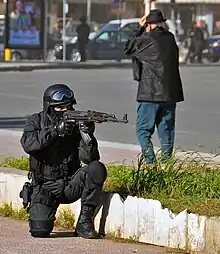
Branch units
| Patch | Branch unit |
|---|---|
| Policia e Rendit The Order Police is tasked to deal with issues of public order. | |
| Policia Kufitare dhe Migracionit The Border Police is in charge of patrolling the border. | |
| Policia Rrugore The Road Police administers road safety. | |
| FNSH The Rapid Intervention Force is the quick intervention unit dealing mostly with cases of violent riots, special operations, etc. | |
| Shqiponjat The Eagles are a rapid intervention unit that handles domestic criminal activities. | |
| RENEA The Department of Neutralization of Armed Elements is the main counter-terrorism and critical incident response unit. |
Equipment
- Glock 34
- TT-33
- Beretta 92
- Beretta PX4 Storm
- Beretta APX
- Makarov PM
- Beretta ARX 160
- HS Produkt VHS
- Heckler & Koch MP5
- Heckler & Koch UMP
- Heckler & Koch MP7
- ASh-82
- AKM
- RPD machine gun
- RPK machine gun
- Sako TRG M10
- Sako TRG-42
- Heckler & Koch HK417
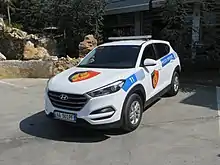
Vehicles
- Aprilia Motorcycles
- Ford Focus
- Chevrolet Aveo
- Volkswagen e-Golf
- Hyundai Accent
- Hyundai i10
- Hyundai Santa Fe
- BMW 5 Series
- Škoda Octavia
- Iveco VM 90
- Land Rover Defend 4x4 Turkey has donated armored vehicles[14]
- Mil Mi-8 (air support)
- Zodiac Nautic (Sea Patrol, in use by Special Police Forces)
Directors
| No. | Name | Term in office | |
| 1 | Halim Gostivari | 13 January 1913 | 24 May 1913 |
| 2 | Fehim Mezhgorani | 24 May 1913 | 30 January 1914 |
| 3 | Hil Mosi | 1 February 1914 | 30 March 1914 |
| 4 | Veli Vasjari | 1 April 1914 | 30 June 1914 |
| 5 | Sulejman Kërçiku | 2 October 1914 | 27 January 1916 |
| – | Halim Gostivari | 28 August 1919 | 17 December 1920 |
| 6 | Ahmet Sinani | 17 December 1920 | 10 January 1922 |
| – | Veli Vasjari | 11 January 1922 | 22 April 1922 |
| – | Halim Gostivari | 22 April 1922 | 21 August 1922 |
| 7 | Musa Çelepia | 21 August 1922 | 26 December 1922 |
| 8 | Hamza Isaraj | 10 December 1924 | 25 December 1924 |
| 9 | Qazim Bodinaku | 24 February 1926 | 7 July 1926 |
| 10 | Rustem Ymeri | 20 December 1926 | 1927 |
| – | Hil Mosi | 3 September 1928 | 1929 |
| 11 | Zef Kadarja | 31 August 1940 | 23 March 1942 |
| 12 | Theodor Stamati | 24 March 1942 | 26 November 1942 |
| 13 | Shyqyri Borshi | 26 November 1942 | 4 June 1943 |
| 14 | Gjush Deda | 4 June 1943 | 30 August 1943 |
| 15 | Kolë Radovani | 1 September 1943 | 13 October 1943 |
| 16 | Skënder Selmanaj | 15 October 1943 | 10 January 1944 |
| 17 | Tahir Kolgjini | 10 January 1944 | 24 November 1944 |
| 18 | Namik Xhafa | 24 November 1944 | 20 March 1947 |
| 19 | Lako Polena | 24 March 1947 | 2 February 1948 |
| 20 | Sali Ormeni | 16 February 1948 | 2 March 1951 |
| 21 | Maqo Çomo | 2 March 1951 | March 1952 |
| 22 | Delo Balili | March 1952 | 1 May 1956 |
| 23 | Xhule Çiraku | 1 May 1956 | February 1968 |
| 24 | Kasëm Kaso | February 1968 | January 1980 |
| 25 | Agron Tafa | January 1980 | August 1982 |
| – | Kasëm Kaso | August 1982 | 31 December 1984 |
| 26 | Dilaver Bengasi | 1 January 1987 | 17 July 1990 |
| 27 | Fadil Cani | 17 July 1990 | 1 May 1992 |
| 28 | Astrit Mehaj | 1 May 1992 | 22 June 1993 |
| 29 | Sabri Jacaj | 22 June 1993 | 15 June 1995 |
| 30 | Agim Shehu | 15 June 1995 | 30 June 1997 |
| 31 | Sokol Baraj | 3 July 1997 | 16 May 1998 |
| 32 | Besnik Bregu | 16 May 1998 | 4 September 1998 |
| 33 | Hasan Ahmetaj | 4 September 1998 | 9 November 1998 |
| 34 | Veton Gjoliku | 9 November 1998 | 20 January 1999 |
| 35 | Veli Myftari | 20 January 1999 | 22 November 2000 |
| 36 | Bilbil Mema | 23 November 2000 | 19 August 2002 |
| 37 | Bajram Ibraj | 12 September 2002 | 30 March 2007 |
| 38 | Ahmet Prençi | 30 March 2007 | 28 October 2009 |
| 39 | Hysni Burgaj | 28 October 2009 | 9 September 2013 |
| 40 | Artan Didi | 10 October 2013 | 31 March 2015 |
| 41 | Haki Çako | 15 April 2015 | 8 January 2018 |
| 42 | Ardi Veliu | 5 February 2018 | 8 October 2021 |
| 43 | Gledis Nano | 8 October 2021 | 31 August 2022 |
| 44 | Muhamet Rrumbullaku | 8 September 2022 | Incumbent |
References
- "Rriten pagat për 93 % të punonjësve të Policisë së Shtetit". www.punetebrendshme.gov.al.
- Gilaj, Bledi (5 September 2015). "Policia rrit me 21% numrin e punonjësve - Gazeta SHQIP Online".
- "Albanian Telegraphic Agency (ATA), 98-01-11". www.hri.org.
- "Collapse of the Ponzi schemes 1997". International Monetary Fund. Retrieved 9 March 2015.
- Albanian Rebellion of 1997#Opening of the depots
- Operation Silver Wake
- Operation Libelle
- "NL MOD History of MAPE". Dutch Ministry of Defence. Archived from the original on 9 March 2016. Retrieved 9 March 2015.
- "Corruption in Albania 2009 - Summary of Findings". Institute for Development Research and Alternatives. Archived from the original on 21 August 2010. Retrieved 9 September 2010.
- Republic of, Albania. "Modernizimi i Policisë së Shtetit". www.punetebrendshme.gov.al. Ministry of Internal Affairs.
- Law on State Police, Albania (2014). Ranks of Albanian police (PDF). Albania: Ministry of Internal Affairs. p. 22.
- Albanian State Police insignia, Albania (2016). Ranks insignia of the Albanian police officers (PDF). Albania: General Directorate of State Police. pp. 5–14, 53. Retrieved 24 July 2017.
- "Albanian Police". Uniforminsignia.net. 2013. Retrieved 26 February 2020.
- "Turkey has donated armored vehicles and security equipment to Albania police | January 2020 Global Defense Security army news industry | Defense Security global news industry army 2020 | Archive News year". armyrecognition.com. Retrieved 18 January 2020.

